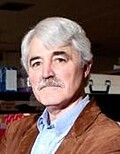The European Commission is facing critical decisions on how to regulate endocrine disruptors. At a recent EU Conference, Thomas Zoeller, serving as spokesperson for The Endocrine Society, described how EDCs present a global health threat, and why it is critical that decisions on regulatory criteria be derived from a present-day understanding of the endocrine system, and not be based on outdated approaches.
On this call, Dr. Zoeller described critical features of hormone action, using the thyroid as an example. He also explained why among the options proposed by the European Commission, there is only one rational approach for regulating EDCs. Gwynne Lyons, Policy Director at CHEM Trust then highlighted some of the remaining issues in moving forward and set out the EU’s next steps foreseen by EU regulators.
Featured Speaker
 R. Thomas Zoeller, PhD is Professor of Biology at the University of Massachusetts, Amherst. His current research focuses on the role of thyroid hormone in brain development with an emphasis on the fetal brain. Dr. Zoeller’s lab also studies the mechanisms by which environmental endocrine disruptors can interfere with thyroid hormone action in the brain and his laboratory has published over 100 peer reviewed papers on these topics. He has received numerous awards for his work, including the “Scientist of the Year – 2002” from the Learning Disabilities Association. He is currently a member of EPA’s chartered Science Advisory Board and is chair of the Exposure and Human Health Committee. He has written extensively on issues of endocrine disruption and public policy.
R. Thomas Zoeller, PhD is Professor of Biology at the University of Massachusetts, Amherst. His current research focuses on the role of thyroid hormone in brain development with an emphasis on the fetal brain. Dr. Zoeller’s lab also studies the mechanisms by which environmental endocrine disruptors can interfere with thyroid hormone action in the brain and his laboratory has published over 100 peer reviewed papers on these topics. He has received numerous awards for his work, including the “Scientist of the Year – 2002” from the Learning Disabilities Association. He is currently a member of EPA’s chartered Science Advisory Board and is chair of the Exposure and Human Health Committee. He has written extensively on issues of endocrine disruption and public policy.
 Gwynne Lyons is Policy Director at CHEM Trust and a former member of the UK Health and Safety Commission’s Advisory Committee on Toxic Chemicals. CHEM Trust is a UK registered charity that works at European, UK and International levels to prevent man-made chemicals from causing long term damage to wildlife or humans, by ensuring that chemicals which cause such harm are substituted with safer alternatives. In 2008, Gwynne was listed in the Independent on Sunday’s list of Britain’s top 100 environmentalists as “Britain’s most effective expert on toxic chemicals.”
Gwynne Lyons is Policy Director at CHEM Trust and a former member of the UK Health and Safety Commission’s Advisory Committee on Toxic Chemicals. CHEM Trust is a UK registered charity that works at European, UK and International levels to prevent man-made chemicals from causing long term damage to wildlife or humans, by ensuring that chemicals which cause such harm are substituted with safer alternatives. In 2008, Gwynne was listed in the Independent on Sunday’s list of Britain’s top 100 environmentalists as “Britain’s most effective expert on toxic chemicals.”
This half-hour teleconference call is one in a monthly series sponsored by the Collaborative on Health and the Environment’s EDC Strategies Group.The CHE EDC Strategies Group is chaired by Carol Kwiatkowski (TEDX), Sharyle Patton (Commonweal), and Genon Jensen (HEAL). To see a full list of past calls in the series and listen to the MP3 recordings please visit the CHE Endocrine DDisruptingChemicals webpage.
